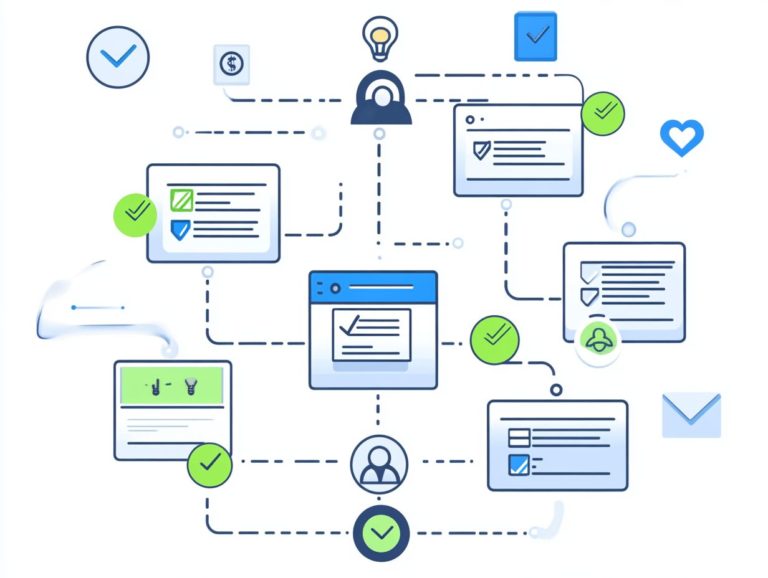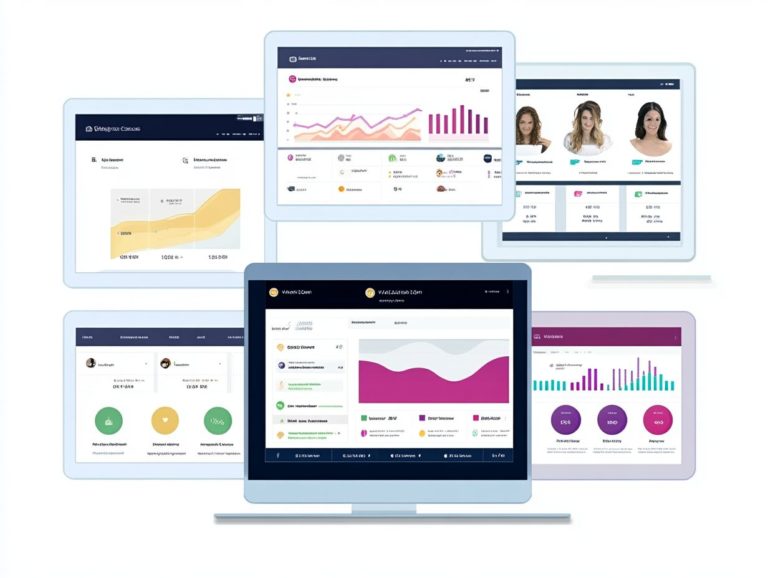Comparing CRM Performance Metrics: What to Measure
In today s competitive landscape, grasping CRM performance metrics is essential for any business looking to strengthen its client relationships.
This article delves into key performance indicators (KPIs), guiding you to pinpoint what truly matters for your organization.
You ll learn how to select the right metrics, implement effective tracking systems, and interpret data with clarity.
Insights from various industries showcase best practices that can elevate your approach.
Dive in to uncover how to harness CRM metrics for data-driven decisions that will propel your business forward.
Contents
- Key Takeaways:
- Key Performance Indicators (KPIs) for CRM
- Choosing the Right Metrics for Your Business
- Implementing and Tracking CRM Performance Metrics
- Using CRM Performance Data
- Comparing CRM Performance Across Industries
- Frequently Asked Questions
- Why do CRM performance metrics matter?
- Why is it important to compare CRM performance metrics?
- What are some common CRM performance metrics to compare?
- How should I interpret the data from comparing CRM performance metrics?
- What are some potential challenges when comparing CRM performance metrics?
- How frequently should I compare CRM performance metrics?
Key Takeaways:

- Discover the right CRM metrics for your business by considering factors such as your industry, goals, and customer needs.
- Implement and track CRM performance metrics using best practices to make data-driven decisions and improve overall performance.
- Compare CRM performance across industries by analyzing case studies and examples to gain insights and improve strategy.
What are CRM Performance Metrics?
CRM Performance Metrics serve as vital indicators that enable you to evaluate the effectiveness of your CRM systems. To maximize your understanding, consider the five key metrics to monitor post CRM implementation. They provide essential insights into customer interactions, sales conversion rates, and operational efficiency.
By understanding the impact of your CRM initiatives on customer satisfaction and loyalty, you can dramatically boost your revenue and achieve your business goals.
Leveraging these performance metrics allows you to establish benchmarks, enhancing productivity and improving processes across your teams, all while nurturing better customer relationships.
These metrics encompass key performance indicators such as:
- Customer lifetime value: The total revenue your business can expect from a single customer.
- Churn rate: The percentage of customers who stop using your service over a given period.
- Net promoter score: A measure of customer loyalty and the likelihood of them recommending your business to others.
By adopting a data-driven approach to analyze these metrics, you can craft tailored strategies that elevate customer experience and bolster your sales processes.
The insights you gain not only enhance individual performance but also promote team collaboration, ensuring everyone is aligned with shared customer-centric goals. In today s fiercely competitive landscape, consistently monitoring and refining these benchmarks is essential for maintaining a robust market position.
Key Performance Indicators (KPIs) for CRM
Key Performance Indicators (KPIs) for CRM are measurable values that show how effectively a company is achieving its key business objectives.
These KPIs offer valuable insights into multiple facets of customer interactions and operational efficiency, enabling sales executives and managers to monitor performance in relation to vital business objectives.
Sales Metrics
Sales metrics serve as essential indicators that reflect the effectiveness of your company’s sales process within its CRM framework.
These include vital metrics related to sales conversion rates and revenue generation.
Metrics such as revenue per customer, closing ratios, and average deal size provide invaluable insights into how effectively your team is converting leads into loyal clients.
For instance, by analyzing the revenue generated per customer, you can tailor your marketing strategies and refine your sales pitches to target high-value prospects more precisely.
Tracking the closing ratio allows you to pinpoint areas for improvement in your sales techniques, while a clear understanding of average deal size aids in accurate revenue forecasting.
Utilizing tools like sales dashboards and CRM analytics not only streamlines your tracking of these key performance indicators but also delivers a comprehensive view of overall sales health, enabling you to make more informed decisions.
Customer Service Metrics
Customer service metrics are vital for assessing how effectively your CRM handles inquiries. They ensure high customer satisfaction and quick response times.
Metrics like the Net Promoter Score (NPS) measure customer loyalty. This score helps predict growth by showing how likely customers are to recommend your services.
Monitoring response times helps you address inquiries promptly. Quick responses build consumer trust.
High resolution rates mean you re solving customer issues effectively, boosting their experience and fostering loyalty.
These metrics guide your strategic decisions, improving service delivery and strengthening customer relationships.
Marketing Metrics

Marketing metrics help you judge the success of your campaigns and how engaged users are. They reveal insights into customer journeys and their impact on sales.
A metrics dashboard lets you monitor key indicators like conversion rates and customer acquisition costs easily. This data helps you make informed decisions.
These insights deepen your understanding of what resonates with your customers and highlight areas needing strategic adjustments.
Automation tools track these metrics seamlessly, reducing manual effort while maintaining accuracy, allowing your marketing team to focus on data interpretation and campaign refinement.
This ultimately propels you toward achieving your marketing goals.
Choosing the Right Metrics for Your Business
Selecting the right metrics is essential to ensure your CRM initiatives align with your business goals.
This thoughtful approach enables effective performance measurement and continuous improvement.
Factors to Consider
When determining the ideal metrics for your CRM strategy, consider your business goals and assess the effectiveness of your existing processes. Evaluate the level of collaboration required within your team.
Along with these key considerations, align your metrics with customer preferences to ensure your strategy resonates with your target audience.
Operational efficiency matters. Streamlined processes lead to better resource allocation and enhanced service delivery.
By prioritizing customer experience, you can establish metrics that reflect satisfaction and engagement, paving the way for more meaningful interactions.
With a comprehensive understanding of these factors, you can make informed, data-driven decisions that optimize your CRM efforts and cultivate stronger customer relationships.
Implementing and Tracking CRM Performance Metrics
Implementing and tracking CRM performance metrics is crucial for gaining insights into customer interactions and understanding how to measure CRM software effectiveness.
This optimization ensures that every engagement is meaningful and impactful.
Best Practices
Employing best practices in CRM performance measurement is essential to adopting metrics that drive engagement and continuous improvement, especially when comparing CRM reporting tools.
Focusing on user adoption means your teams must receive comprehensive training to enhance their understanding of the CRM system. This training should highlight the benefits of streamlined workflows and improved customer interactions.
Cultivating a culture of data-driven decision-making within your organization allows employees at all levels to leverage insights from the CRM.
When these foundational practices are established, they lead to optimal performance, heightened customer satisfaction, and increased organizational success.
Using CRM Performance Data

Understanding CRM performance data is essential for organizations like yours aiming to make informed, data-driven decisions.
This approach enhances customer relationships and propels your business toward greater success.
How to Make Data-Driven Decisions
Making data-driven decisions with CRM performance data requires a systematic approach to interpreting insights and aligning them with your organizational objectives and customer preferences.
Start by establishing key performance metrics that resonate with your goals, like customer acquisition costs and retention rates.
Gathering and analyzing customer feedback through surveys and reviews unveils valuable insights into customer satisfaction and highlights improvement areas.
Conducting a thorough competitive analysis deepens your understanding of market positioning and reveals successful strategies employed by your rivals.
By synthesizing this information, you can craft tailored marketing campaigns and elevate customer interactions, cultivating increased loyalty and retention among your client base.
Comparing CRM Performance Across Industries
When comparing CRM performance across various industries, you unlock valuable insights into how different sectors utilize CRM systems.
This knowledge shows how each sector tailors its approaches to achieve distinct business goals and elevate customer satisfaction.
Case Studies and Examples
Case studies and examples of CRM implementations across various industries reveal how organizations enhance customer satisfaction and operational efficiency.
By examining specific instances, you can see how companies in retail, healthcare, and technology have adopted unique strategies to monitor their CRM performance metrics effectively.
- For example, a leading retail chain used customer feedback data to refine its service offerings, leading to a significant boost in customer loyalty and sales conversions.
- Conversely, a healthcare provider harnessed CRM analytics to optimize appointment scheduling, elevating patient satisfaction and minimizing wait times.
These insights highlight the necessity of tailored metrics for evaluating performance, reinforcing that lessons learned in one industry can be remarkably valuable and adaptable for others.
Frequently Asked Questions
Why do CRM performance metrics matter?

CRM performance metrics are quantifiable measures used to evaluate the success and effectiveness of a CRM system. They provide insights into how well the CRM is performing and can guide you on what to look for in a CRM to identify areas for enhancement.
Why is it important to compare CRM performance metrics?
Comparing CRM performance metrics allows companies to understand how their CRM system is performing against industry standards and their goals. To further refine this process, it’s beneficial to explore how to measure CRM success, which helps pinpoint specific areas to enhance your CRM effectiveness.
What are some common CRM performance metrics to compare?
Common CRM performance metrics include customer satisfaction, customer retention rate, lead conversion rate, sales growth, and customer lifetime value. For a deeper understanding, consider evaluating CRM success through additional important metrics such as response time, contact velocity, and sales cycle length.
How should I interpret the data from comparing CRM performance metrics?
Always analyze the data in context to unlock hidden insights! Look for patterns and trends over time, and consider the impact of external factors. Comparing against industry benchmarks and your goals provides a better understanding of the data.
Ready to boost your CRM strategy? Let s dive in!
What are some potential challenges when comparing CRM performance metrics?
Comparing CRM performance metrics can be tricky, especially when considering key metrics in CRM. You might face issues like inconsistent data and measuring metrics differently.
Ensure that the data is accurate. Consistent measurement helps make reliable comparisons.
How frequently should I compare CRM performance metrics?
How often you compare CRM metrics depends on your company s goals. Regular reviews, like monthly or quarterly, help you track progress and make necessary adjustments.
Act now to ensure your CRM is performing at its best!






